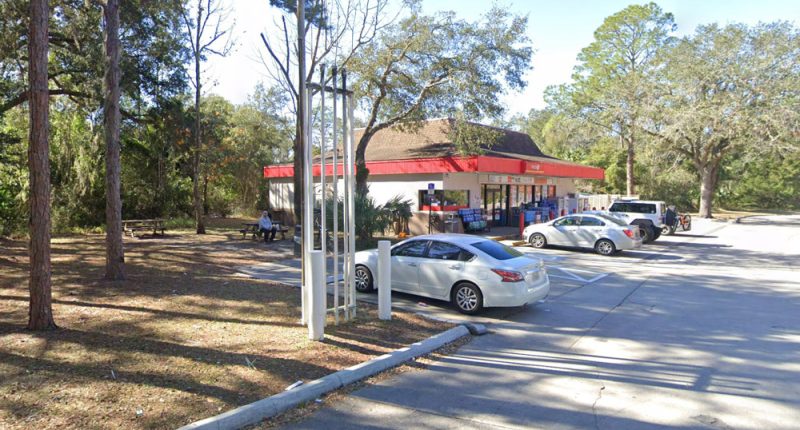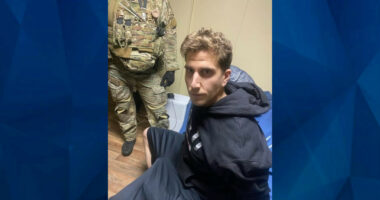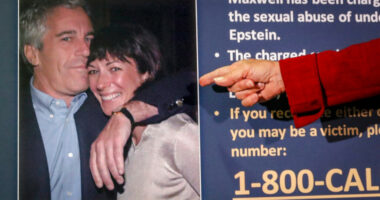
In a stand your ground ruling that startled law enforcement and the State Attorney’s Office, Circuit Judge Dawn Nichols on Monday dismissed felony charges against 23-year-old Hunter Detherow, who was facing five to 20 years in prison for a fight at the Palm Harbor Circle K a year ago that left one man with four broken ribs and another with stab wounds, a collapsed lung, 49 stitches and a black eye. Detherow, a former Marine, was not injured. The two men were twice his age, though one of them was nearly twice his weight.
It is the second time in 10 weeks that Nichols ruled for a defendant in a stand your ground motion. At the end of December in DeLand, she ruled that 79-year-old Edward Druzolowski was justified in shooting his 42-year-old neighbor Brian Ford, in front of Ford’s 8-year-old son, during an argument over tree limbs Ford had been cutting on Druzolowski’s side of the property line. As in the Detherow ruling, Nichols cited the disparity in Ford’s size and age compared to Druzolowski’s, and Ford’s “known” past as a trouble-making felon who bragged about beating people up to justify the shooting. Druzolowski was facing life in prison if convicted. He was freed.
Both cases reflect how difficult lawmakers have made it for prosecutors to defend against stand your ground motions. In one of many amendments to the law loosening the standard in favor of those using deadly force, prosecutors have been put in the position of themselves having to defend their charges before they have a chance to prove them. In another change to stand your ground, those invoking it do not have to attempt to evade a situation before using deadly force no matter where they are, as long as they are somewhere legally and not themselves doing anything illegal.
Beyond that, and in the absence of video or audio evidence, or objective witnesses, judgments fall almost entirely on the subjective interpretation of the credibility and profiles of those involved rather than on evidence of violence or injuries sustained. The subjectivity is the judge’s. That’s how the Detherow case went from what law enforcement and prosecutors thought was going to be an almost certain conviction to a dismissal. Case closed.
“Neither Mr. Gross’ version of events nor Mr. Gatrell’s [sic] version of events relaying that the defendant started the initial physical encounter were plausible or believable,” the judge concluded, referring to Jeffrey Gartrell, 52, and David Gross, 50, the two alleged victims. “Of the three participants involved in the altercation, the defendant’s recitation of the events was the most clear and concise.” The judgment was unusual in that form alone is seldom the dominant element that determines a witness’ credibility, while the judge’s determination of Gartrell’s overall testimony as “less than credible” is objectively debatable.
The following is a detailed account of that case, based on the testimonies of those involved and court records, rare as this type of disposition has been in Flagler County.
Detherow, a resident of Forsythe Lane in Palm Coast, has no prior criminal history. After his discharge from the Marines he worked at Hobby Lobby and for a solar energy company before he “recently decided to pursue my passion in art and making customized shoes,” he said at the stand your ground hearing on Feb. 27.
He was arrested on a second degree felony charge of aggravated battery with a deadly weapon and a third-degree felony charge of felony battery after attacking Jeffrey Gartrell, 52, and David Gross, 50, at the Palm Harbor Circle K the night of March 17, 2024. Since the incident took place on the side of the building by its picnic tables, there was no video surveillance footage.
Gross, the stabbing victim, “is going to have long lasting issues,” Clark told the court. “He’s got basically nerve damage that if he turns his head a certain way, he can’t lay on that side, shooting pain going up his neck.” For Gross, it was broken ribs.
Detherow had faced up to 20 years in prison, with a minimum of five according to the sentencing guidelines, as one of the victims was injured very severely. The prosecution had offered five years in prison followed by 10 years on probation, with restitution and other requirements. The case had been scheduled for docket sounding, the very last step before trial, when Detherow filed the stand your ground motion on Feb. 5, through his assistant public defender, Courtney Davison.
Under Florida law, defendants have the right to file such motions and argue self-defense, parallel to the prosecution’s case. If they are successful, the charges are thrown out. But first, they must show that there’s enough evidence to make the case for self-defense, what’s referred to as a “prima facia case, or a case at first sight.
The judge was dubious.
“What right now is very clear to me is that there was a fight and somebody got really, really hurt,” Nichols said at the Feb. 27 hearing. “That’s what I can tell from what’s alleged so far. But I don’t see a prima facia case where the state has to overcome what you’ve alleged, because all that’s been alleged so far is that there’s a fight, and not necessarily who started the fight or who upped the ante with a weapon.” She added explicitly: “I don’t see that we have enough to go forward on a legitimate stand your ground claim.”
Nichols was going to give Davison time to amend her motion to make that stand your ground motion possible. It was Clark who said she was ready to argue the motion as it was that day, especially since she’d subpoenaed witnesses for the hearing. She was confident. She acted as if she had no reason to doubt an outcome favoring the prosecution. So the hearing went ahead.
What’s not in dispute is that Gross and Gartrell are friends, that they’d E-biked to spend a couple of hours smoking cigarettes and drinking at the Nature Creek Preserve, and that sometime between 9 and 10 p.m. that evening, they biked to the Palm Harbor Circle K for another sex on the beach and a beer. Detherow said he’d spent the afternoon first helping a homeless man, then sitting at one of the picnic tables on the side of the Circle K, reading his bible.
Clark downplayed the drinking. “We have their medical records. There’s no indications of any substances in his system,” she said of Gartrell. “There may have been some drinking, “but it wasn’t enough to even be a blip on the radar at the hospital.”
Gartrell is on disability for permanent double vision from a paralyzed muscle in the left eye from an embolism and head trauma. He said he suffers from horrible back pain from a “messed up” spinal cord, causing neuropathy. The judge cited his medical history against him to make the case for a less-than-credible testimony: “He testified that he had many health issues and volunteered that he also suffers from double vision ‘all the time,’” the judge wrote in an acerbic footnote. “One would think this impaired sight might make it difficult for him to testify as to what he saw regarding the events in question. Additionally, it seems improbable that he would be able to ride an electric bike for long distances or perform half the physical feats he accomplished that day if he in fact suffered the laundry list of ailments to which he testified.”
Detherow saw Gross and Gartrell approach the store on their electric bikes. He’d never seen either before. They parked. Gartrell went into the store, Gross stood guard by the bikes. Gross acknowledged that he didn’t want the bike to get stolen. Detherow walked up to the trash can near him to throw a wrapper and started talking to him about the bikes.
Gartrell then joined them, and “insisted he wanted to sit with me at the bench that I was seated at, where my bag and my belongings were,” Detherow said. Gartrell sat next to him, Gross across the picnic table. Gartrell was drinking a 16-ounce sex on the beach he’d poured into his metal flask. Gross was drinking a Four Loco Beer. It was all friendly banter but for what Detherow described as an “odd sexual comment” from Gartrell, who was “kind of creeping me out.”
He did not say what that comment was and neither attorneys asked him, leaving a basic but important charge hanging: did Gartrell make a verbal pass at him? Did he question his sexuality? Did he compliment his looks? Make a reference to his many tattoos? Detherow described Gartrell as a “greasy kind of looking guy,” the kind of language usually associated with racial or homophobic inferences. Gross to him was more “put together.” In any case, that angle, which could have potentially opened hate-crime inferences, was never explored by the prosecutor nor the judge, who was free to ask questions at any point (and did several times).
For a while all the chatter was small talk. Then Detherow, apparently out of nowhere, asked Gross what his “spiritual beliefs” were. Gross got defensive and belligerent about his disbelief in God, Detherow said, gesturing, speaking loudly and making him nervous and scared. As Detherow heard it, “he was saying, God’s not real and you can just do whatever you want, and you can have as much things as you want.”
Not so, Gross testified. He’d never told him that there’s no such thing as God, but he told him about his Buddhism, and that seemed to perturb Detherow.
Gartrell had been absent for a few minutes when that interaction started, having gone to buy a bag of nuts. Gartrell testified that when he returned he heard Gross and Detherow talk about Buddhism. Then Detherow rather oddly decided to ask Gartrell the very same question that had set off Gross about his spiritual beliefs “in hopes to maybe stop the negativity and aggression Mr. Gross had towards me,” Detherow testified. (Gartrell told him he’s a Christian.) That Detherow would ask the question at that point startled the prosecutor.
Clark: “Mr. Gross had been agitated with you about religion, you decided, in order to calm that situation down, you would then ask Mr. Gartrell what his religious views were.”
Detherow: “Right,” Detherow said. “Maybe I can gain some sort of ground with Mr. Gartrell to where it eases the tension that Mr. Gross had towards me.”
“So you thought the best way to ease tension about a religious conversation was to talk to someone else about religion,” Clark said.
Detherow: “Yes.”
Clark: “Not come up with a completely different topic–the weather, the E-bikes, what you had for dinner, whatever.”
Detherow: “Yeah.”
Clark:”And then once Mr. Gartrell got back, you started the conversation with him, and then you said that they both continued to egg me on.”
Detherow: “Yes.”
Clark: “So egging you on was getting you to converse with him about whatever your religious views were?”
Detherow: “Yes ma’am.”
Clark: “So they weren’t threatening you.”
Detherow: “In that moment, no.”
According to Detherow, the two other men then asked Detherow what his beliefs were. But every time he’d speak, Gross would “start to get very defensive and very belligerent again.” According to Gartrell, Detherow had gone on for several minutes talking about his religion. He and Gross wanted to leave, and Gross was uncomfortable with the conversation, so he interrupted Detherow to change the conversation.
“That’s when he reacted crazy,” Gartrell said. “He took a few steps right towards Dave, got into Dave’s face, started yelling, telling him he was being disrespectful, over and over.” Gross corroborated the account in much the same words.
Gartrell told Detherow to relax and take a step back and started walking toward his bike, thinking it was time to leave. There was a pause in the action. Then: “He came from behind and grabbed me from behind with both of my arms at my side and landed me right on my chest,” Gartrell said. “He immediately started punching me in the back.” Gartrell, pinned and his face on the ground, said he was unable to do anything. He was in shock, curled up in a ball, hoping for Gross to pull Detherow off of him, which he soon did.
According to Detherow, he’d stepped back from the bench and lit a cigarette, only for them to egg him on. Gross was “slurring his words” and seemed drunk to Detherow, who nevertheless was willing to speak with them as long as they didn’t interrupt him, he said. When they did, “I raised my voice and I said I was trying to express how important God and Jesus is to my life,” he testified.
Gartrell, according to Detherow, laughed and told him Gross would destroy him, and he threatened him a couple of more times. “I told him not to threaten me ever again,” Detherow said.
As Detherow described it on the stand, Gartrell was holding and aggressively swinging a metal drinking flask in his face, so Detherow, who was standing, kicked it. The flask somehow struck Gartrell with such force that Gartrell fell off the bench. Detherow (the former Marine) says he also fell from the kicking motion as he slipped on leaves–falling right next to Gartrell. Detherow is unclear at this point as he describes Gartrell “trying to get adjusted to hurt him” while Gross is running at him, so Detherow starts punching Gartrell in the face.
It is inexplicable how the judge found any of this sequence of events as described by Detherow, however lucidly, less than incredible.
Gartrell denied any of this happened–the threatening, the ridiculing, the swinging of the drinking flask, the kick. (Gross was more equivocal. He said he didn’t “see it happening at all.”) The only thing that happened was Detherow knocking Gartrell to the ground and punching him. Gartrell ended up with four broken ribs. He went to the hospital by ambulance that night.
“Mr. Gross was running towards me, and I started punching Mr. Gartrell,” Detherow said. Multiple times, which Gartrell allegedly fended off with his hands. Gross didn’t lay a hand on him until after he’d been punching Gartrell.
Detherow then stands up as Gross is swinging at him. Gross testified that Detherow came punching at him first, after Gross pushed him off of Gartrell. Detherow claimed he looked for an escape as he swung at Gross, who slammed him to the ground and grabbed around his upper body, constraining Detherow “wrestling-style,” Gross said. Gross held Detherow in what the judge’s order described as a “bear hug.” (Gartrell described them as briefly “engaged.”) Detherow feared Gartrell would hit him as he tries to push off Gross.
“I tried to tap out. I tried to punch him, I tried to do whatever I could,” Detherow said.
Even Gross thought he was tapping out. That’s how it felt on his body. “He was actually stabbing me,” Gross said.
“I tried to push away the best I could, but I wasn’t strong enough, and he started to choke me out,” Detherow said. “And I start to start to lose consciousness, and I feel like my life just kind of flashed before my eyes. And I started getting memories of being a child, and memories of my brother who passed away.” But though Gross was clutching him, Detherow managed to grab his knife “and I poked him with my right hand.” He thought Gross would let go. He did not, so “I kept pushing and kept poking until he let me go.”
What he described as “poking,” the prosecutor described as “stabbing.” Gartrell, for his part, testified that Gross and Detherow were on the ground only a split second.
The men separated, Detherow running back to his house, the two men biking to one of theirs.
Detherow claims the men attacked him without provocation. But he did not call 911 when he got home. He said he didn’t want to be a victim again.
“You didn’t call because you didn’t want the police to realize you were the guy that stabbed someone at the Circle K,” Clark said.
“I didn’t want them to know that I got attacked,” Detherow said. Again, he didn’t explain why.
Photographs deputies took of him showed no bruising, other than a small laceration on his hand, and a CSI technician testified that Deherow had no signs of injuries. The judge had a caveat: “Based upon so many tattoos, it would be different to see any bruising, but based upon what I see, I don’t see any indicated bruising,” Nichols said.
Gross was in the hospital for three days with stab wounds, a punctured lung, with injuries to the back of his neck, the elbow, the back ribs, a black eye. He’d never landed a blow on Detherow.
Davison in her closing to the judge focused her stand-your-ground argument on the bear-hug moment, discounting everything that led up to it and exploiting a central flaw in the law: it relies on de-contextualization, in effect nullifying an essential tenet in the rules of evidence. “We’ll focus mostly on that as far as that goes,” she said. “He at that point believed he was being choked out. He had no other means to escape. He couldn’t breathe at the time. He believed that at that point in time, that was the only option that he had, was to see the knife that he had on him and to begin to poke at Mr. Gross, to be able to free himself and prevent serious bodily injury at that point, because he was in fear for his life based on the circumstances. So pretty much at this point, that is what our argument would be.”
Clark didn’t discount what happened before. “The defendant was the one that was the aggressor in the situation,” she argued. “He started this whole thing and continued the aggression until finally he had stabbed the victim and then took off. So I don’t believe he has at all shown that he had a right to defend himself. He created the situation to begin with by attacking Gartrell and then attacking Gross and continuing that attack with a knife.”
Nichols took the case under advisement, and earlier this week issued her ruling, siding with Detherow: “The defendant felt panicked and tried to break the bear hug to escape,” she wrote, accepting Detherow’s version of events uncritically. “The defendant was trying to get out of the hold and to get away. The defendant was having difficulty breathing and felt that he was choking out. The defendant tried to “tap out” but Mr. Gross would not loosen his hold on the defendant. The defendant felt that he was starting to lose consciousness while Mr. Gross continued to strengthen his hold and constrict the defendant’s ability to breathe. The defendant remembered he had a knife on him and was in fear for his life.”
Nichols blamed Gartrell for initiating the conflict and wrote that neither Gartrell nor Gross “were able to pinpoint how the physical altercation started,” even though during the hearing both described Detherow attacking Gartrell and landing the first punches. What they could not describe was why, a question still unanswered, and now moot. The case is over.
![]()
Order in State v. Detherow (2025):
detherow-order









